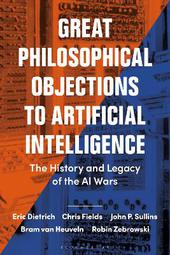
|
Great Philosophical Objections to Artificial Intelligence: The History and Legacy of the AI Wars
Hardback
Main Details
| Title |
Great Philosophical Objections to Artificial Intelligence: The History and Legacy of the AI Wars
|
| Authors and Contributors |
By (author) Eric Dietrich
|
|
By (author) Chris Fields
|
|
By (author) John P. Sullins
|
|
By (author) Bram Van Heuveln
|
|
By (author) Robin Zebrowski
|
| Physical Properties |
| Format:Hardback | | Pages:312 | | Dimensions(mm): Height 234,Width 156 |
|
| Category/Genre | Philosophy
Philosophy of the mind
Philosophy of science |
|---|
| ISBN/Barcode |
9781474257114
|
| Classifications | Dewey:006.301 |
|---|
| Audience | | Tertiary Education (US: College) | |
|---|
|
Publishing Details |
| Publisher |
Bloomsbury Publishing PLC
|
| Imprint |
Bloomsbury Academic
|
| Publication Date |
14 January 2021 |
| Publication Country |
United Kingdom
|
Description
Winner of the 2022 CHOICE Outstanding Academic Titles This book surveys and examines the most famous philosophical arguments against building a machine with human-level intelligence. From claims and counter-claims about the ability to implement consciousness, rationality, and meaning, to arguments about cognitive architecture, the book presents a vivid history of the clash between the philosophy and AI. Tellingly, the AI Wars are mostly quiet now. Explaining this crucial fact opens new paths to understanding the current resurgence AI (especially, deep learning AI and robotics), what happens when philosophy meets science, and the role of philosophy in the culture in which it is embedded. Organising the arguments into four core topics - 'Is AI possible', 'Architectures of the Mind', 'Mental Semantics and Mental Symbols' and 'Rationality and Creativity' - this book shows the debate that played out between the philosophers on both sides of the question, and, as well, the debate between philosophers and AI scientists and engineers building AI systems. Up-to-date and forward-looking, the book is packed with fresh insights and supporting material, including: - Accessible introductions to each war, explaining the background behind the main arguments against AI - Each chapter details what happened in the AI wars, the legacy of the attacks, and what new controversies are on the horizon. - Extensive bibliography of key readings
Author Biography
Eric Dietrich is Professor of Philosophy of Binghamton University, USA. Chris Fields is an independent scholar based in France. John P. Sullins is Professor of Philosophy at Sonoma State University, USA. Bram Van Heuveln is Lecturer in the Cognitive Science Department at Rensselaer Polytechnic Institute, USA. Robin Zebrowski is Associate Professor of Cognitive Science, Chair of the Program in Cognitive Science, Beloit College, USA.
ReviewsThe book resembles a buffet meal offering many appealing individual pieces ... makes philosophical arguments on AI accessible to non-philosophers-itself an important accomplishment. * CHOICE * An extraordinary book that does what scientists all too often don't do: highlight what is still unknown and lay the foundations for future development of a discipline. A must-read for both students and the experts of AI. * Riccardo Manzotti, Professor of Philosophy, IULM University, Milan, Italy * The promise and threat of artificial intelligence has sharpened debate on the nature of mind, morality, selfhood, intelligence and consciousness. Great Philosophical Objections to Artificial Intelligence deftly presents the recent history of this debate, from Turing to today, with engaging explanations of the technical issues, key insights, current stalemates, and the impact of advances in cognitive neuroscience. * Donald D. Hoffman, Professor Emeritus of Cognitive Science, University of California, Irvine, USA * This book cuts an accessible and engaging trail through the past 70 years of philosophical contention over the very possibility of artificial intelligence (AI) and some of its implications. It hits the sweet spot of providing a wonderful resource for the student and practitioner of the philosophy of AI and its recent history, while also giving a general audience a window into how philosophy works. The AI wars have evolved; we may have moved on from some battle lines, but understanding how they were fought enriches our mental repertoire and arms us with tools that will help us tackle new fronts in our struggle to come to terms with AI. * Clayton T. Morrison, Associate Professor in the School of Information, University of Arizona, USA *
|